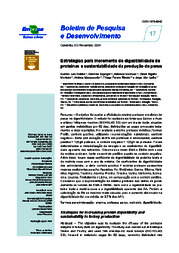Embrapa Suínos e Aves
 Busca de Publicações
Busca de Publicações
Estratégias para incremento de digestibilidade de proteínas e sustentabilidade da produção de perus.
Autoria: KRABBE, E. L.; GOPINGER, E.; MAZZUCO, H.; MONTEIRO, D. P.; MASSUQUETTO, A.; RIBEIRO, T. P.; LUDKE, J. V.
Resumo: RESUMO: O objetivo foi avaliar a eficácia da enzima protease em dietas de perus na digestibilidade. O estudo foi realizado na Embrapa Suínos e Aves e utilizou 144 perus machos (NICHOLAS SS) com um dia de idade, alojados em gaiolas metabólicas por 60 dias, distribuídos ao acaso em quatro tratamentos e doze repetições. Foi avaliada a enzima protease dietética (Tecmax Pro®), controle positivo, utilizando recomendações nutricionais; controle negativo– Dieta com redução de 6% em proteínas e aminoácidos; controle positivo + 125g/t protease; e controle negativo + 125g/t de protease. Foram determinados a metabolização da energia e os coeficientes de digestibilidade aparente dos nutrientes. Observou-se maior EMA e EMAn com o uso da enzima protease, tanto no controle positivo quanto no controle negativo. Além disso, houve maior coeficiente de digestibilidade da proteína bruta e da matéria seca com o uso da enzima. Os coeficientes de digestibilidade dos aminoácidos, a dieta controle positivo + enzima protease apresentou maiores coeficientes para Ac. Aspártico, Ac. Glutâmico, Serina, Glicina, Histidina, Arginina, Treonina, Alanina, Prolina, Tirosina, Valina, Metionina, Isoleucina, Leucina, Fenilalanina e Lisina, em comparação com o controle positivo. Conclui-se que a suplementação da enzima protease nas dietas de perus aumenta os valores de EMA e EMAn, bem como a digestibilidade da proteína bruta e matéria seca e a digestibilidade aparente dos AA. Porém, a valorização de 6% se mostrou muito elevada, pois o aumento observado na digestibilidade foi, em média, de 3,7% dos AA´s. ABSTRACT: The objective was to evaluate the efficacy of the protease enzyme in turkey diets on digestibility. The study was carried out at Embrapa Swine and Poultry and used 144 one-day-old male turkeys (NICHOLAS SS), housed in metabolic cages for 60 days, randomly distributed into four treatments and twelve replicates. The dietary protease enzyme (Tecmax Pro®) was evaluated, positive control, using nutritional recommendations; negative control - Diet with 6% reduction in proteins and amino acids; positive control + 125g/t protease; and negative control + 125g/t protease. The metabolism of energy and the apparent digestibility coefficients of the nutrients were determined. Higher AME and AMEn were observed with the use of the protease enzyme, both in the positive control and in the negative control. In addition, there was a higher digestibility coefficient of crude protein and dry matter with the use of the enzyme. In terms of amino acid digestibility coefficients, the positive control diet + protease enzyme showed higher coefficients for Aspartic Acid, Glutamic Acid, Serine, Glycine, Histidine, Arginine, Threonine, Alanine, Proline, Tyrosine, Valine, Methionine, Isoleucine, Leucine, Phenylalanine and Lysine, compared to the positive control. It is concluded that protease enzyme supplementation in turkey diets increases AME and AMEn values, as well as crude protein and dry matter digestibility and apparent AA digestibility. However, the 6% increase was very high, since the observed increase in digestibility was, on average, 3.7% of AA.
Ano de publicação: 2024
Tipo de publicação: Folhetos
Unidade: Embrapa Suínos e Aves
Palavras-chave: Digestibilidade, Digestibility, Enzima, Enzymes, Nutriente, Nutrients, Peru, Protease, Turkeys

